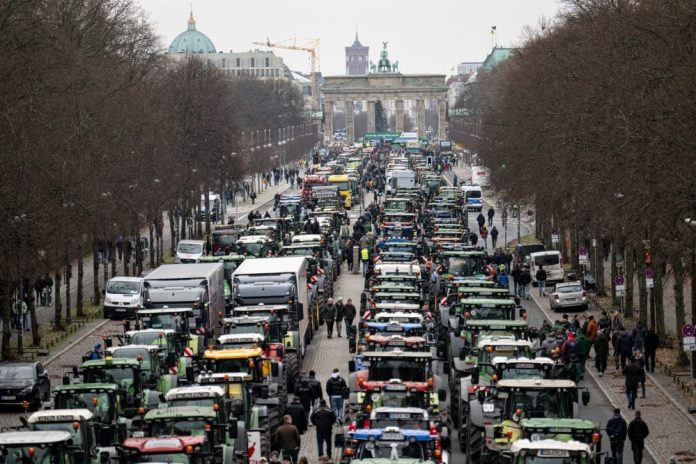Discontent among the EU farming community has reached a climax this week, with protests gaining momentum in France, Germany, Poland, Austria. In addition to national demonstrations, farmers are travelling to Brussels to address the European Parliament to denounce EU-level agricultural policies.
In some countries, the protests are not entirely surprising. First flared up in the Netherlands in 2019 due to government demands to halve livestock production to reduce nitrogen oxide emissions.
Brussels residents are already used to farmers coming to the city’s European quarter to spray buildings with milk or fill the streets with livestock to protest EU agricultural regulations.
Nowadays, the problem is much more patchy than even a few years ago. The factors behind the current situation are several: firstly, the practically blocked trade routes in the Black Sea and the lifting of import restrictions from Ukraine, which allowed its agricultural products to flood European markets; secondly, the unwillingness of European politicians to listen.
Why? The main feature is that the average Ukrainian organic farm covers about 1,000 hectares (2,471 acres), while its European counterparts cover only 41 hectares.
As a consequence, prices in neighbouring countries such as Hungary, Poland and Romania have suddenly dropped, leaving local farmers unable to sell their crops.
Further, the EU imposed trade restrictions on Ukraine’s exports to neighbouring countries, but only for a limited period. When the ban expired, the governments of Budapest, Warsaw and Bratislava announced their own restrictions. Then the opposite reaction occurred. Ukraine immediately sued. Consequently, relations soured not only on international law, but also simply between neighbours.
Eastern European countries are demanding that the EU finally reconsider its trade liberalisation measures with Ukraine.
Poland was engulfed in protests on 24 January. Farmers began a nationwide protest against Ukrainian agricultural imports, noting that “Ukrainian grain should go where it belongs, to the Asian or African markets, not to Europe,” according to Adrian Wawrzyniak, a spokesperson for the Polish farmers’ trade union, told Polish media.
In Romania, farmers and hauliers protest against high diesel prices, insurance tariffs and EU measures. Farmers in much of Germany are outraged at the gradual removal of tax breaks for agricultural diesel, which they say will drive them into bankruptcy. In France, farmers blocked large sections of motorways, creating a crisis for new Prime Minister Gabriel Attal, who travelled to a farm in the south-west of the country to propose a series of measures in an attempt to calm their discontent.
Southern Europe seemed to have so far stayed out of the protests. But already this week in Sicily, farmers blocked roads to protest against the regional government, which they say has failed to pay them compensation for last summer’s prolonged heat wave and drought. This may be just the beginning of what is happening in central Europe.
In Europe, discontent is often fuelled by particular dissatisfaction with EU policy, and with European elections just around the corner in June, Eurosceptic parties are gaining a voice, so action needs to be taken now. German ministers are trying to soften proposals to end tax breaks for farmers on farm diesel that have sparked a storm of protests. Polish Prime Minister Donald Tusk promised to meet Ukrainian representatives in early March to agree on regulating transit and product exports.
European Commission President Ursula von der Leyen acknowledged that a “strategic dialogue” was needed between agricultural groups and EU decision-makers.
